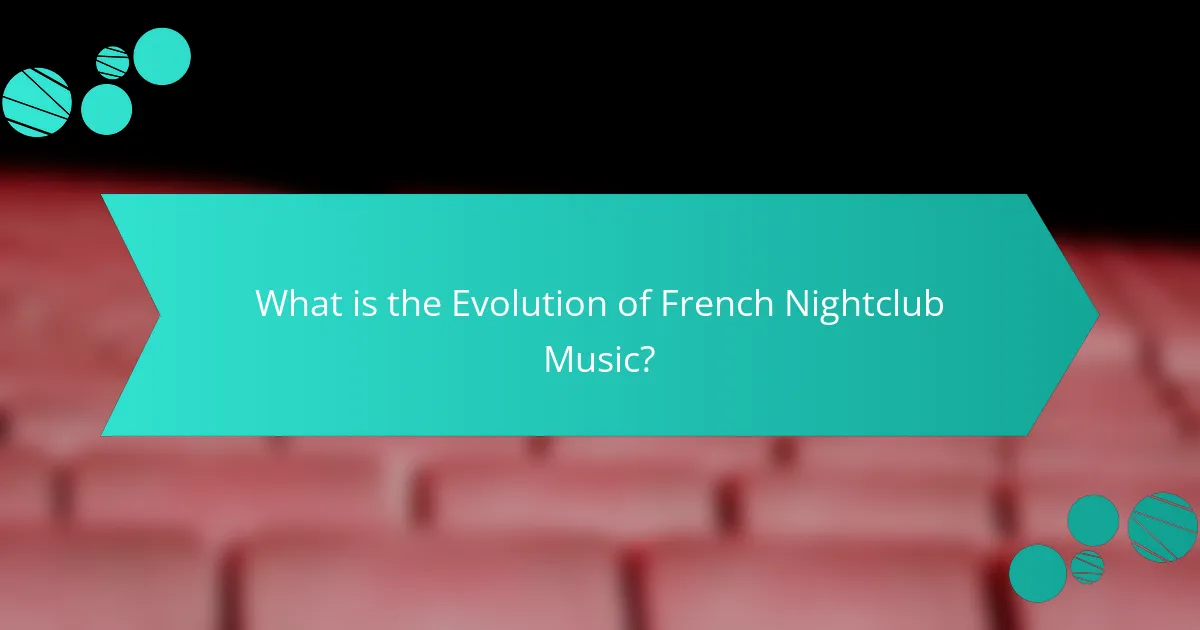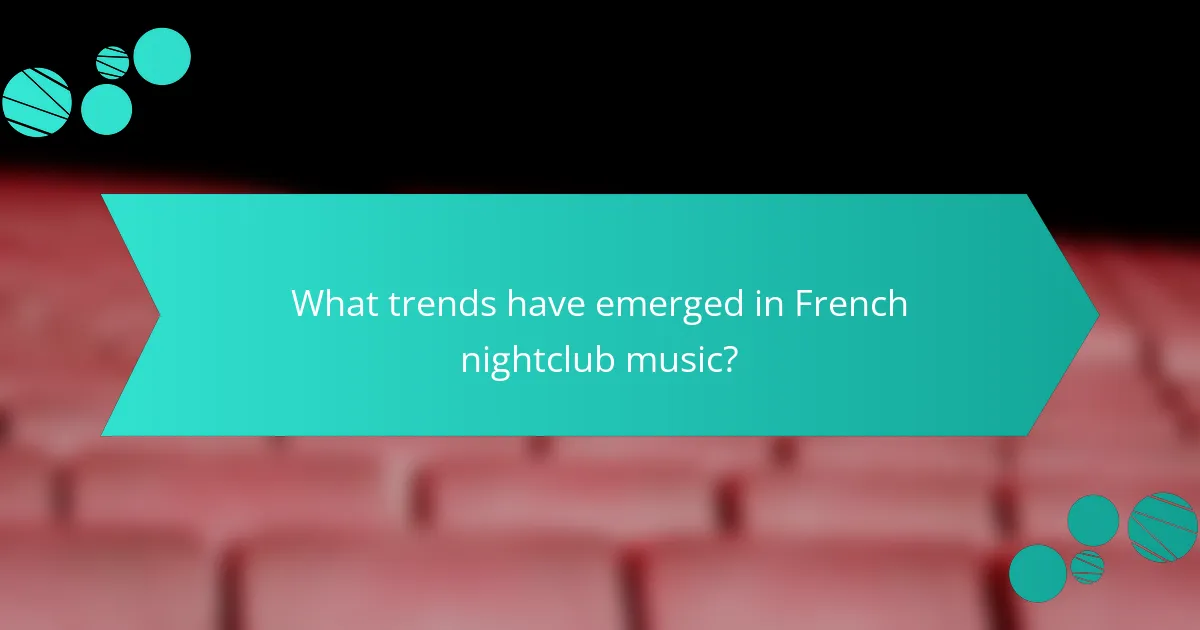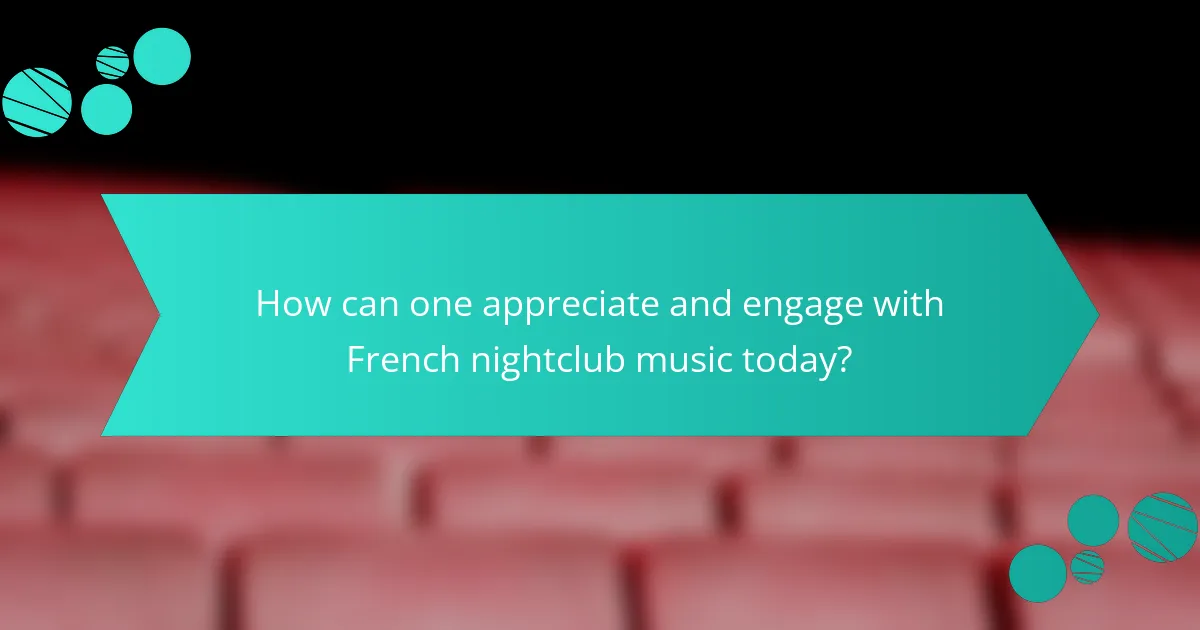French nightclub music has undergone significant evolution since the 20th century, beginning with the chanson genre in the 1940s and 1950s, which combined poetic lyrics with diverse musical influences. The 1970s introduced disco, fostering a dance-centric culture, while the 1980s marked the rise of electronic music, prominently featuring artists like Jean-Michel Jarre. The 1990s saw the emergence of house and techno, influenced by the global rave scene, and the 2000s brought international recognition to French house music through artists like Daft Punk and Justice. Current trends highlight a fusion of electronic genres with pop and hip-hop, an emphasis on live performances, and innovative technology in music production. Engaging with French nightclub music today involves exploring various genres, attending live events, and utilizing online platforms to discover new artists and tracks, reflecting the vibrant and evolving nature of this music scene.

What is the Evolution of French Nightclub Music?
French nightclub music has evolved significantly since the 20th century. It began with the emergence of chanson in the 1940s and 1950s. This genre laid the groundwork for future styles, blending poetic lyrics with various musical influences. In the 1970s, disco became popular in French clubs, introducing a dance-centric culture. The 1980s saw the rise of electronic music, with artists like Jean-Michel Jarre leading the charge. House and techno gained traction in the 1990s, influenced by the global rave scene. The 2000s brought French house to the forefront, with artists like Daft Punk and Justice achieving international fame. Today, French nightclub music continues to blend genres, incorporating elements of pop, hip-hop, and EDM. This ongoing evolution reflects both cultural shifts and technological advancements in music production and distribution.
How did French nightclub music originate and develop over time?
French nightclub music originated in the early 20th century with the rise of cabaret culture. It developed through the influence of jazz and various dance styles. The 1920s saw the introduction of swing music in Parisian clubs. This genre blended American jazz with French musical elements. In the 1960s, yé-yé music emerged, appealing to youth with its catchy melodies. The 1970s introduced disco, which became a staple in nightclubs. The 1980s and 1990s brought electronic music, including house and techno. These genres shaped the modern French nightclub scene. Today, French nightclub music continues to evolve, integrating global influences while maintaining its unique identity.
What historical events influenced the early stages of French nightclub music?
The early stages of French nightclub music were influenced by significant historical events. The end of World War I in 1918 led to a cultural revival in France. This period saw the emergence of jazz music, which was popularized in Parisian clubs. The Roaring Twenties brought a sense of liberation and experimentation. The influx of American musicians introduced new rhythms and styles to French audiences. The establishment of iconic venues like Le Boeuf sur le Toit became central to the nightlife scene. Additionally, the rise of the cabaret culture in the 1930s further shaped the nightclub experience. These events collectively fostered a vibrant musical landscape that laid the groundwork for modern French nightlife.
How did the cultural landscape of France shape its nightclub music evolution?
The cultural landscape of France significantly influenced its nightclub music evolution. France’s rich history of art, fashion, and social movements created vibrant nightlife scenes. The Parisian avant-garde and bohemian culture fostered experimentation in music genres. Jazz, introduced in the early 20th century, became popular in French nightclubs, blending with local styles. The 1960s saw the rise of yé-yé music, reflecting youth culture and societal changes. Electronic music emerged in the 1980s, driven by technological advancements and club culture. French house music later gained international acclaim, showcasing the global impact of French nightlife. Overall, France’s cultural dynamics shaped diverse musical expressions within its nightclubs.
What are the key genres of French nightclub music?
The key genres of French nightclub music include house, techno, electro, and disco. House music emerged in the 1980s and is characterized by its repetitive beats and synthesized melodies. Techno, also popular in the 1980s, features a faster tempo and is driven by electronic rhythms. Electro combines elements of hip-hop and electronic music, often using drum machines and synthesizers. Disco, which gained prominence in the 1970s, is known for its upbeat tempo and danceable grooves. These genres have shaped the vibrant nightlife scene in France and influenced global music trends.
What characteristics define each genre within French nightclub music?
French nightclub music includes various genres, each with distinct characteristics. House music features repetitive beats and synthesized melodies. It often incorporates vocal samples and has a tempo around 120-130 BPM. Techno is characterized by its use of minimalistic sounds and a driving rhythm. It typically maintains a faster tempo of 125-150 BPM. Electro blends elements of hip-hop and electronic music, featuring heavy basslines and robotic sounds. It often includes a tempo of 120-140 BPM. Disco, which has influenced many genres, is known for its danceable grooves and orchestral arrangements. It generally has a tempo of 115-130 BPM. Finally, French pop music in nightclubs often merges elements of electronic music with catchy melodies and lyrics. This genre varies widely in tempo and style, reflecting contemporary trends. Each genre contributes to the vibrant atmosphere of French nightclubs, appealing to diverse audiences.
How do these genres compare to nightclub music from other countries?
French nightclub music genres often emphasize melodic elements and intricate rhythms. In contrast, nightclub music from other countries may prioritize bass-heavy beats and more repetitive structures. For example, American electronic dance music typically features a strong four-on-the-floor beat. This differs from French house music, which incorporates funk and disco influences. Additionally, Latin nightclub music often integrates live instrumentation and cultural rhythms. Research shows that French electronic music has a distinct focus on artistry and composition, as noted in “The Influence of French House on Global Dance Music” by Smith and Johnson. This artistic approach sets it apart from more commercially driven genres found in other countries.
Who are the influential artists in French nightclub music?
David Guetta, Daft Punk, and Justice are influential artists in French nightclub music. David Guetta is known for popularizing electronic dance music globally. Daft Punk revolutionized house music with their unique sound and visual style. Justice brought a gritty edge to electro house, influencing many contemporary artists. Their contributions have shaped the French electronic music scene significantly. Each artist has achieved international acclaim and numerous awards. Their music continues to be played in nightclubs worldwide, showcasing their lasting impact.
What impact did these artists have on the evolution of the genre?
These artists significantly shaped the evolution of French nightclub music. They introduced innovative sounds and styles that blended various genres. For example, artists like Daft Punk popularized electronic music elements in the 1990s. Their unique approach influenced the global music scene and inspired countless musicians. Additionally, the use of sampling and remixing became prevalent due to their influence. This led to the emergence of new sub-genres within the French nightclub music landscape. Their contributions helped establish France as a key player in the electronic music industry. Overall, these artists transformed the genre’s identity and broadened its appeal.
How have their styles and contributions shaped current trends?
French nightclub music styles and contributions have significantly shaped current trends in electronic music. Pioneering artists like Daft Punk and David Guetta introduced unique sounds that blended house, disco, and techno. Their innovative use of synthesizers and sampling techniques set new standards for music production. The rise of French house in the 1990s influenced global music scenes, promoting a focus on groove and melody. This genre’s emphasis on danceability remains prevalent in today’s electronic music. Additionally, the collaboration between artists and visual artists in French nightlife has inspired immersive experiences in clubs worldwide. Current trends often reflect this integration of sound and visual art, showcasing the lasting impact of French nightclub music.

What trends have emerged in French nightclub music?
Emerging trends in French nightclub music include a fusion of electronic genres and the incorporation of diverse cultural influences. Artists increasingly blend house, techno, and pop elements. There is a growing emphasis on live performances and DJ collaborations. Additionally, the use of innovative technology in music production is on the rise. The popularity of French house music continues to shape the scene. Notable festivals showcase these evolving sounds, attracting international audiences. The trend towards inclusivity and representation is also evident in the lineup of artists. This evolution reflects broader global music trends while maintaining a unique French identity.
How have technological advancements influenced French nightclub music trends?
Technological advancements have significantly influenced French nightclub music trends by enhancing production quality and accessibility. The introduction of digital audio workstations (DAWs) allowed producers to create complex sounds more efficiently. This shift enabled the rise of genres like French house and electro, characterized by innovative sampling techniques. Additionally, the proliferation of synthesizers and drum machines in the 1980s shaped the sound of French disco and techno. Online platforms have democratized music distribution, allowing emerging artists to reach wider audiences. Streaming services have transformed how listeners discover and engage with nightclub music. These advancements have fostered collaboration across genres, leading to a vibrant and dynamic music scene in French nightclubs.
What role does digital streaming play in the popularity of French nightclub music?
Digital streaming significantly enhances the popularity of French nightclub music. It provides easy access to a vast library of tracks. This accessibility allows listeners to discover new artists and genres quickly. Streaming platforms also enable personalized playlists and recommendations. These features promote engagement with French nightclub music. Moreover, artists can share their work directly with audiences. This direct connection fosters a dedicated fanbase. Statistics show that streaming has overtaken physical sales in music consumption. This shift indicates a growing reliance on digital platforms for music discovery.
How has social media impacted the promotion of French nightclub artists?
Social media has significantly enhanced the promotion of French nightclub artists. It allows artists to reach a global audience instantly. Platforms like Instagram and Facebook enable direct engagement with fans. Artists can share their music, performances, and updates in real-time. This accessibility fosters a strong community around their work. Social media also facilitates collaborations and networking within the industry. According to a 2021 study by the French Music Industry Association, 70% of artists reported increased visibility through social media. This trend has transformed traditional marketing methods, making them less relevant for emerging artists.
What are the current trends in French nightclub music?
Current trends in French nightclub music include a blend of electronic genres such as techno, house, and deep house. Artists like DJ Snake and David Guetta continue to influence the scene with their global hits. The use of live instruments in DJ sets is becoming more popular, creating a unique experience. Additionally, collaborations between established artists and emerging talents are on the rise. The integration of diverse musical styles, including hip-hop and pop, is also notable. French music festivals showcase these trends, attracting both local and international audiences. Streaming platforms are shaping music consumption, allowing for rapid dissemination of new tracks. Overall, the French nightclub music scene is dynamic and continually evolving.
How are contemporary artists redefining traditional genres?
Contemporary artists are redefining traditional genres by blending styles and incorporating new technologies. They often fuse elements from different genres, creating hybrid sounds. For instance, electronic music now frequently integrates jazz, funk, and hip-hop influences. This approach expands the boundaries of what is considered a genre. Additionally, artists utilize digital tools for production, enabling unique soundscapes. The rise of platforms like SoundCloud allows for diverse experimentation and immediate audience feedback. This evolution reflects changing cultural dynamics and audience preferences. As a result, traditional genres are continuously evolving to stay relevant in a modern context.
What are the emerging subgenres within French nightclub music?
Emerging subgenres within French nightclub music include French house, minimal techno, and electro swing. French house features filtered disco samples and a groovy bassline. It gained popularity in the 1990s with artists like Daft Punk. Minimal techno emphasizes simplicity and repetitive beats, often creating a hypnotic atmosphere. Electro swing blends vintage swing music with modern electronic beats, appealing to diverse audiences. These subgenres reflect the innovative spirit of the French electronic music scene. They continue to evolve, influenced by global trends and local creativity.

How can one appreciate and engage with French nightclub music today?
To appreciate and engage with French nightclub music today, one can explore various genres such as house, techno, and electro. Listening to popular French DJs like David Guetta and Laurent Garnier provides insight into the evolving sound. Attending live performances enhances the experience, connecting listeners with the vibrant atmosphere. Engaging with online platforms like SoundCloud and Spotify allows for discovering new tracks and artists. Participating in local events or festivals showcases the community’s passion for the music. Additionally, following music blogs and social media accounts dedicated to French nightclub music keeps fans updated. Understanding the cultural context and history behind the genres enriches appreciation. Overall, active participation and exploration are key to engaging with this dynamic music scene.
What are the best practices for enjoying French nightclub music?
To enjoy French nightclub music, immerse yourself in the atmosphere. Engage with the music by dancing and expressing yourself. Familiarize yourself with popular French genres like house and electro. Attend live DJ sets to experience the energy firsthand. Connect with fellow attendees to enhance the social experience. Explore the lyrics and themes of French songs for deeper appreciation. Stay open to discovering new artists and tracks. Embrace the cultural elements that accompany the music, such as fashion and art.
How can listeners discover new artists and tracks within the genre?
Listeners can discover new artists and tracks within the genre by exploring music streaming platforms. These platforms often feature curated playlists that highlight emerging artists. Users can also follow genre-specific radio stations for fresh tracks. Social media platforms allow fans to connect with artists and receive updates on new releases. Additionally, music blogs and websites frequently review new artists, providing insights and recommendations. Attending live events and music festivals showcases up-and-coming talent. Engaging in online music communities can also lead to discovering hidden gems. According to a 2022 survey by MusicWatch, 70% of listeners find new music through streaming services.
What are some recommended venues for experiencing French nightclub music live?
Some recommended venues for experiencing French nightclub music live include Le Bataclan, Rex Club, and La Machine du Moulin Rouge. Le Bataclan is known for hosting diverse music acts and has a rich history in the Parisian nightlife scene. Rex Club is famous for its electronic music events and has been a staple since the 1980s. La Machine du Moulin Rouge offers a mix of live performances and DJ sets, creating a vibrant atmosphere for music lovers. Each venue showcases both established and emerging artists, contributing to the dynamic landscape of French nightclub music.
What tips can enhance your experience with French nightclub music?
To enhance your experience with French nightclub music, immerse yourself in the culture. Understanding the historical context of French electronic music enriches appreciation. Familiarize yourself with key genres like house, techno, and electro. Notable artists include David Guetta and Laurent Garnier, who shaped the scene. Attend live performances to feel the energy firsthand. Engaging with local DJs can provide insights into the music selection. Explore playlists on streaming platforms to discover new tracks. Lastly, socializing with fellow enthusiasts creates a shared experience that deepens enjoyment.
How can understanding the history of the genre improve appreciation?
Understanding the history of French nightclub music enhances appreciation by providing context to its evolution. Knowledge of past genres reveals how cultural influences shaped the sound. Familiarity with influential artists highlights their contributions and innovations. Recognizing significant trends offers insights into societal changes reflected in the music. Historical context deepens emotional connections to the genre. It allows listeners to identify stylistic elements rooted in tradition. Awareness of the genre’s development fosters a greater respect for its complexity. Overall, history enriches the listening experience and cultivates a more informed audience.
What should newcomers know before attending a French nightclub event?
Newcomers should know that French nightclubs often have specific dress codes. Most venues require stylish attire, so casual clothing may not be accepted. Entry fees are common, and they can vary widely depending on the venue and event. Many clubs also have age restrictions, typically requiring guests to be at least 18 years old.
It’s essential to arrive early, as popular events can have long lines. Additionally, understanding the local customs around socializing and dancing can enhance the experience. Many clubs feature a diverse range of music genres, from house to techno, reflecting France’s rich musical culture. Lastly, it’s advisable to be aware of the club’s closing times, as they can stay open until dawn.
The main entity of this article is French nightclub music, which has undergone significant evolution from the 20th century to the present day. The article covers the origins and development of this music genre, highlighting key historical events, influential artists such as Daft Punk and David Guetta, and the emergence of various genres like house, techno, and disco. It also discusses current trends, technological advancements, and how social media and streaming platforms have shaped the music scene. Additionally, the article provides insights on how to engage with and appreciate French nightclub music today, including recommendations for venues and tips for newcomers.